- Home
- M G Vassanji
The In-Between World of Vikram Lall Page 5
The In-Between World of Vikram Lall Read online
Page 5
Morning came refreshingly, vigorously, with the cocoricoo of a cock, brilliant sunlight smiling through the windows, the radio tuned to Hindustani service, servants chatting outside in Kikuyu, Luo, Nandi, or Swahili, tea paraphernalia clattering in the house, the smell of woodsmoke and hot toast and parantha and butter, and we were all alive and the world was wonderful.
Mwangi, Njoroge’s grandfather, was released two days after being taken away during the police raid. Deepa and I were sent by our mother to take some bananas and chappatis for him to welcome him home. We did not bring curry, because he did not like our curries, preferring his own spinach or bean stews without spices but with a lot of salt. One of the three other men who had been taken with him had been sent to a detention camp. He had been sporting a “Jomo” beard, I had heard, and was one of the two who had tried to escape when the raid began. In my experience, Africans often disappeared, having gone “back home” or been taken into detention or sent to jail for not paying tax or rent or for getting into a brawl.
After we had made our presentation, Deepa ran off to play somewhere. Njoroge was not around. I stayed back and watched Mwangi as he sat crouched outside the doorway of his quarters and proceeded to eat. His knees were grazed and dusty, from going down on them while gardening, and his fingertips were coarse, the nails black-edged. He probably found ugali, a meal made from maize flour, more filling, but chappati was a delicacy for him, and he ate it carefully, cutting each one into quarters, and then into smaller pieces, which he used to scoop up the vegetable and sauce.
What did they do to you at the police station, Muzee, I asked, when he was finished and had put aside his plate.
He smiled, took a long draught of water, emptied the glass. He said, They asked and asked.
What, Muzee? What did they ask?
Am I Mau Mau? I said no.
And then?
They asked me again, as if they had not heard the first time.
And that Sergeant Boniface, that fat one who calls himself the lion, did he ask, too?
Eeh, yes, he too asked, that one. The dog barks loudest in the presence of its master—always know that.
Grinning mischievously at my befuddlement, he stood up to go. I watched him amble toward the front side of the houses, where he usually worked and liked to be found. He was employed jointly by the families on our side of the street. People brought him all sorts of cuttings and seeds to plant and tend to in their patches, though in this year of drought keeping everyone happy about their plants was not easy. He cut the grass and trimmed the hedges. He swept the ground. And he acted as the daytime watchman. For rest he would sit on a front step of a house or under a tree. He was unique among our workers, for no one was rude or shouted orders to him as they did to the others. But there were some complaints that he was slow and that there wasn’t enough work for him. I hated the thought that he might have to leave us. He had worked for a European family in Thompson’s Falls before coming to us, when they left the country. He had been hired and brought to Nakuru by one of the Asian families, who had also helped Njoroge get enrolled in the local Shamsi school.
That was about six months earlier, when I came upon an African boy sitting in our backyard on a stone, shooting pebbles. It was Njoroge.
Ay, I said, don’t you know this is our house?
He looked up, then quietly took a few steps and stood in the no man’s land between our area and the neighbour’s in the next building, and watched me. I knew he was not a servant, a “boy,” because he was in a school uniform, khaki and white. Inspired by his game, I went inside and brought out my set of marbles and started shooting and showing off.
Deepa came running out to join, and as usual started an argument, and as recourse to winning it she casually asked Njoroge, Didn’t you see my shot just graze that marble—a little? No, he said, and smiled with sympathy at her disappointed face.
It’s his turn now, anyway, not yours, she told me with a provoking look and put the shooting marble in Njoroge’s hand.
He was a bony chap, a good three inches taller than I and a year older. His shorts were too big and needed a tight belt to hold them up. For several days after that first meeting, we played with only the most perfunctory words exchanged between the two of us; it was as if we needed each other, yet couldn’t bring forth our private selves, our real natures. It was Deepa, when she would join us, who broke the barrier and brought light and laughter to our play.
His father, Njoroge told us, had gone away to study in Uganda; of his mother he said nothing.
My mother, I think, felt a kinship for him as a child without a mother, and she would sometimes stop him and ask him questions, this being the usual way of conversing with others’ children. What did you eat today, William, what did Grandfather cook? (She couldn’t decide between using his English and Kikuyu names.) Was it enough? How was school? She had already once grilled him about himself: how old he was, who his teachers were, where his village was. This last was an obvious question to her, as an Indian from India. Then she asked where his mother and father were. Yes, nampenda, he had told her, I love my mother, and my own mother smiled, very satisfied.
Once she told him, I too lost my mother when I was young, William. And he gave her a long stare full of awe.
We don’t have heroes, I grumbled to Mother once.
She glared at me, then looked offended. What do you mean, we don’t have heroes? Think of Shree Rama, who was so gentle—
I mean heroes!
He slew the ten-headed Ravana! That’s a hero! And Bhim of the Pandavas took on a whole army alone in the great battle of Mahabharata—
Not those kinds of heroes, Ma! Not gods!
What kind, then? What better heroes than gods?
Bill as Field Marshal Montgomery riding high on his tank (a box atop our cart) searching for the lurking enemy (Vic and Njoroge) behind a sandpile in Tunisia (the dusty, unpaved parking area of the shopping centre). And when subaltern Lall lay wounded in a hospital bed (ours but to do or die, at Bill’s bidding), who should come to tend him with gentle hands and worried face but our own Florence Nightingale, Annie, the Lady of the Coke-bottle lamp, saying, Tut-tut, Vikram Lall, you didn’t take the medicine! And when I was Davy Crockett—a more likely hero than any of my mother’s godly nominations—Njoroge had to play the Indian (Bill refusing because he was not a native) and Deepa was his squaw with her tea set.
But Njoroge’s hero, he said, was Moses.
Moses sent plague on the pharaoh and destroyed his crop and animals, he sent the angel of death in the dark of the night to kill the Egyptians’ eldest sons, until finally the pharaoh gave up and Moses took his people to freedom.
But Jesus hurt no one and he still won, said Annie. Only he himself had to die, as Vicar Robinson said.
I don’t recall our ever enacting a Moses scene.
In the privacy of our backyard, eating scalding-hot pakodas straight from the kadai, courtesy of Mother, Njoroge told me significantly: Jomo is Moses.
Jomo? He is a man?
I had thought Jomo was a kind of beard, an African goatee.
Njoroge nodded. Jomo was the one who was in jail in Kapenguria; when he came out he would take his people to freedom; all the lands of the Kikuyu—he made a sweeping gesture—would be returned to them, all the cattle and sheep would come home to graze. All the white people would go home to England.
A different kind of Moses, then. He would not take his people anywhere, just send the others away.
Even Bill and Annie?
He didn’t reply.
And the Mau Mau—are they his angels?
He shrugged.
I stared at him in wonder. Why did I know so little of the world? What cattle would come home with Jomo? And would the Asians go home to India? I didn’t want to go to India, to the tumult and the dust and where you stepped into shit even in a posh taxi, as Papa described it. Not even to the enchanted forests of Rama and Sita, as Mother would have it. I knew of no world outside
my Nakuru, this home, this backyard, the shopping centre, the school; this town beside the lake of flamingos, under the mysterious Menengai Crater where we sometimes went on family picnics, passing the European area on the other side of the tracks.
All our heroes did wonderful things, but Njoroge’s Jomo-Moses was different. He was alive! He was in prison! And he had powers.
There was a depth to my friend that I could not reach, could never fathom even when we became close. Just as there was a mystery and depth to Bill and his Englishness. Why was my own life so simple? Why did it seem so irrelevant? In that fateful year of our friendship, when we played together I couldn’t help feeling that both Bill and Njoroge were genuine, in their very different ways; only I, who stood in the middle, Vikram Lall, cherished son of an Indian grocer, sounded false to myself, rang hollow like a bad penny.
It goes without saying, though, that with Annie I was entirely myself, at ease and happy.
Deepa came over and dropped, from the basket she had improvised by lifting up the front of her dress at the hem, some more steaming pakodas in the plate between Njoroge and me, and then ran off to play on the swing, throwing curious looks at us as we talked and ate.
You must swear not to tell anybody, Njoroge said, about Jomo. He is our secret.
I swore, by an oath that he called Number One, not to tell anyone.
But I did ask my mother later, Who is Jomo? She gave me a sharp look and shuddered. He is Ravana himself, the leader of the Mau Mau, she said, but he is in prison.
Who is Jomo, Mahesh Uncle? I asked when my uncle next visited from the sawmill. And he too gave me a sharp look.
Jomo Kenyatta, he said. He is the leader of the Africans, and he wants the lands of the Kikuyu returned to them.
Is he Moses?
Another sharp look, then Mahesh Uncle nodded. Yes, he is like Moses, in some ways. But say, who’s been telling you this?
I kept quiet.
He must have thought there was at least some hope for me, if not for his brothers-in-law. He could become extremely tender at such moments, as he became then, saying, while adjusting his black-framed glasses, Now run along, child, go and play, hunh. You’re a bright chap.
This Jomo, I figured, would very well have to leave Mahesh Uncle alone; and if so, my family and I were safe.
Mahesh Uncle’s bluster and angry outbursts, I sensed even as a boy, only camouflaged his emotional vulnerability. I was extremely fond of him, always felt defensive of him when he was put down, usually in his absence by my father’s brothers, as an idler and a failure. His life harboured an essential sadness that resulted from displacement following India’s partition. Mother wanted dearly for him to marry. She made discreet inquiries in Nakuru and Nairobi. But his reputation was known, no one wanted a communist for a son-in-law. But the hope remained in our family that he would mellow and sooner or later find a bride and settle down properly.
Mahesh Uncle’s vocal support of the Kenyan freedom struggle, as he insisted on calling it, made my family rather nervous.
We fought for the independence of India, dammit, he would say. The Africans are doing just the same!
But Gandhiji’s way was nonviolence and…and…negotiation, Mother told him once, Gandhiji didn’t tell us to go and butcher the British!
The British are not being butchered in Kenya—they are exaggerating only to gather world support for their oppression.
Tell that to Mr. Innes, Papa put in. Tell that to the man whose wife and child were cut to pieces.
The one who calls me a Bengali. Don’t you see, sometimes people have to fight for their freedom! All peoples have done it one time or another. So Gandhiji’s way was nonviolence, even that is debatable, but Netaji Bose’s way wasn’t—
Subhas Chandra Bose, Mother uttered with distaste. He was a Bengali.
There was silence.
To Papa these Indian references were quite alien. Even though he took pride in Gandhi’s renown in Europe and America, he couldn’t help also voicing the opinion that the mahatma had been a crafty and definitely an embarrassing-looking Gujarati banya, who in the manner of his wily people had simply fooled the gullible. Of Subhas Chandra Bose, leader of an Indian army that helped the Japanese to fight the British in the Second World War, my father had simply not heard.
It was a moment of triumph for Papa when my uncle had agreed, several months earlier, to take up the position of manager of the Resham Singh Sawmills. My mother was in tears when her brother left. What will he do there, alone in the jungle?
He’ll be safe in the jungle, Papa told her, and muttered, If he doesn’t decide to go and join the Mau Mau himself…He could be sent to jail, with his attitude, he could be sent to detention like that Makhan Singh fellow…He could even get himself hanged!
Tauba! Don’t say that!
Don’t worry, Papa said, going to her on the sofa, sitting beside her. He put his arm around her and squeezed her. We’ll look after your brother. And he is not that far, he will keep visiting us.
My father adored my mother. I loved Mahesh Uncle, but I knew that my mother would have loved my father much more if my uncle had not been around.
I recall a scene in our living room.
Do you remember—
What?
He shook his head, smiling, then looked away.
No, tell me, Mahesh, come on.
Mother and her kid brother, together in our living room, on a Saturday afternoon (Papa pottering about somewhere), discussing their childhood in Peshawar in pre-partition India. They were seated on opposite sofas, her face flushed with pleasure, concern, tenderness. She always wore shalwar-kameez, and today the top was white with red flowers, the pyjama all red, crisply starched. At that moment, not attendant upon my father or the household, or upon Deepa and me, all the needs and demands that took up much of her life, she was a girl once again, radiant and free. How we treasure those youthful years of our lives, what happiness hers must have meant to her.
I would climb on your back and you would take me around, Mahesh began.
On all fours like a horse—hut-hut-hut-chalo!
From room to room and even to the neighbour’s—you must have scraped your knees from that ordeal.
She smiled, said: And you held on to me by my pigtail.
They were silent for a while. Then she murmured: How I remember that house, each and every corner in it, every crack on the wall, I can take you to the spot where the ceiling leaked during monsoon, where the floor was broken under the dining table, the chip on the seventh step—
And I can take you through the streets of Peshawar blind-folded—the halwai where we bought jelebi, the police station where Father locked me up, the dhaba where the Congress youth would meet for strategy. I can name for you all the attendants who served at that dhaba. We’ll never see those streets again. All that madness, cutting up a country in two—that’s the British for you: divide and rule.
But we asked for Partition.
Who?
The Hindus and Muslims.
Not all of them. Just the rich and privileged, misleading the others.
They were silent again. Mother looked up toward the rooms where Papa had gone a few minutes ago, in case he needed her. Then she said, Do you remember when Ma died?
He looked vacantly at her, nodded. Father took me to the pyre when he lighted the fire. Her soul has flown away, he said, it’s only the empty body. She’ll come back in a new body. I rather preferred the old body. How would I recognize the new one, I used to ask him.
I remember, she said. I had to be with you even as I knew she was in pain and dying, and her sisters had gathered around…
After a pause, my mother looked at him and said quickly, Mahesh Bhaiya, why didn’t you make up with him—poor Father—
He was the one who cast me out! He arrested me, his own son, he put me in prison!
Not you alone, and that was his job.
Fine job. Working for the British. And there was that other thing to
o, in 1946, after the world war.
That was also his job.
He was a traitor.
Don’t say that, Mahesh! It was his job, his duty. He was a police inspector. If he had not kept the law—
If who had not kept the law? Papa said, walking in, having just had a wash, smelling of hair oil. He pulled me gently by the ear from where I sat, at the door, looking outside at the road, and said, My spy will tell me, won’t you?
Meanwhile Mother pretended the tears were not glistening in her eyes and gave us all a smile.
Grandfather Verma a traitor! Mahesh Uncle in jail! Now that was food for the imagination…but that life was far away in India and in the past. My life was so ordinary!
There was a framed photo of Grandfather Verma, from the chest up, on one of the walls in the house. He seemed to be in some kind of uniform, police I assumed; he had a large forehead and a thin moustache, and there was a trace of a smile on his lips. He looked rather like the police superintendents of the Indian movies of the fifties and sixties, someone who could have been the movie idol Dev Anand’s superior officer. He sent us cards for Diwali and New Year, with little notes that began, How are you, my little ones? And we in turn wrote short letters to him guided by Mother. After that overheard partial revelation from Mahesh Uncle, I looked upon the photo of Grandfather Verma with some respect. He was my past and there was a mystery about him, which I would find out as I grew up, when the time came for me to know.
I remember another ritual of my father’s. It was a frightening one, performed once or twice a month, late on a Sunday night. Very suddenly, a little after nine o’clock just as the news ended, as if at a whim he would go over to the front door, pull aside the drape on it, and stare outside for a minute or so. By this time Mother would be extremely nervous. Slowly Papa would undo one of the locks. Then, purposefully he went to his and Mother’s bedroom and brought out his revolver, a rather large and ugly, dull black thing inside a brown holster, and a small cardboard box of ammunition. He also had with him a yellow piece of paper, a pamphlet on which he placed the gun and ammo on the dining table. He would pick up the gun and, facing away from us all, hold it up in his hand. Then he would walk to the door, open it wide into the dark night. He would take a step outside.

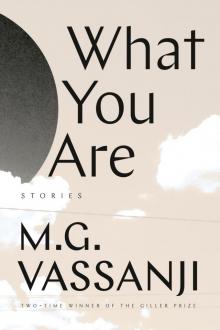 What You Are
What You Are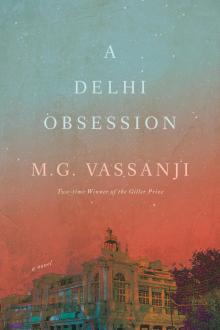 A Delhi Obsession
A Delhi Obsession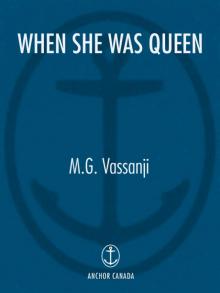 When She Was Queen
When She Was Queen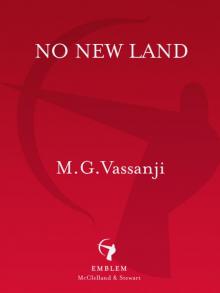 No New Land
No New Land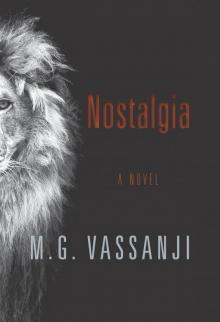 Nostalgia
Nostalgia Mordecai Richler
Mordecai Richler The Book of Secrets
The Book of Secrets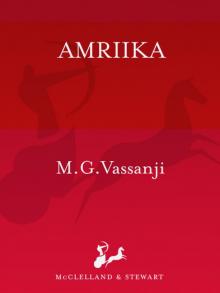 Amriika
Amriika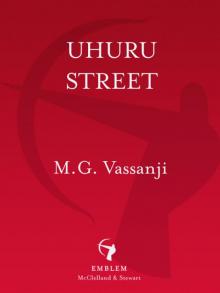 Uhuru Street
Uhuru Street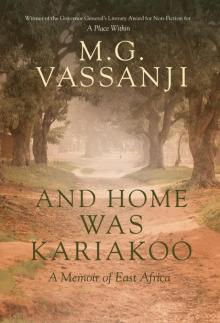 And Home Was Kariakoo
And Home Was Kariakoo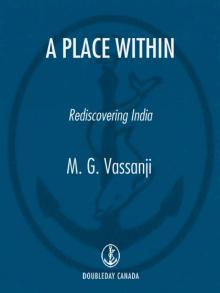 A Place Within
A Place Within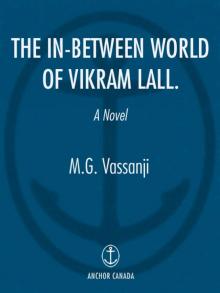 The In-Between World of Vikram Lall
The In-Between World of Vikram Lall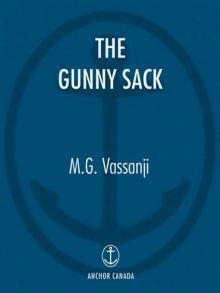 The Gunny Sack
The Gunny Sack